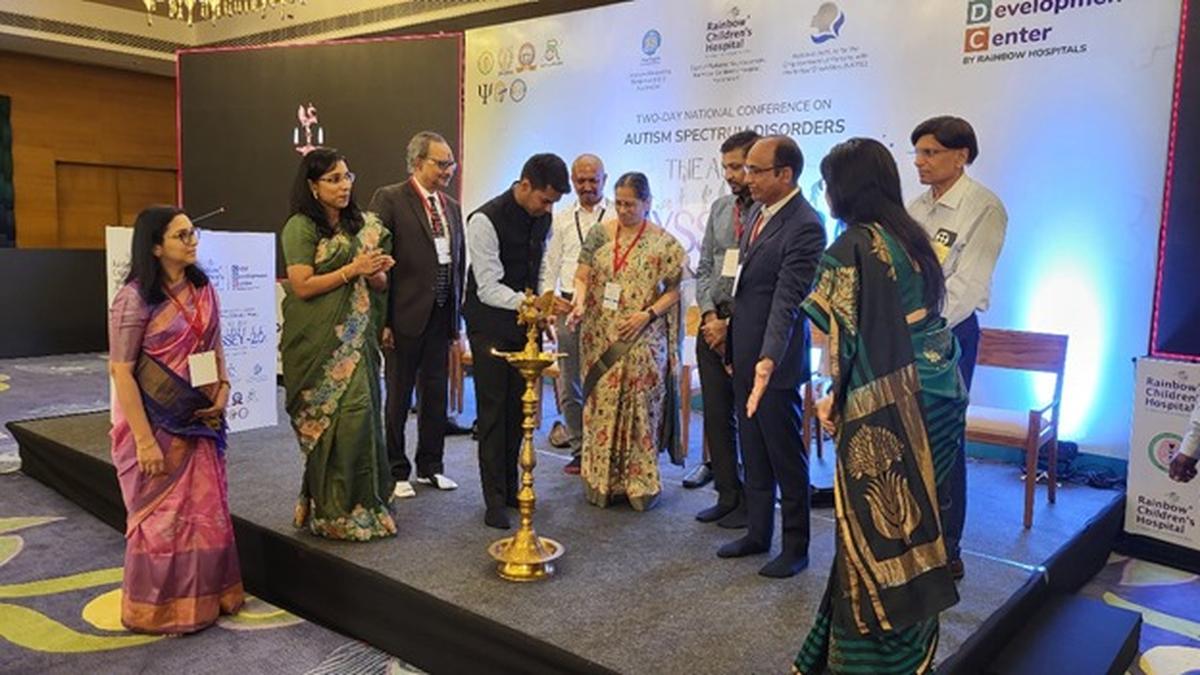
Autism is a long-term condition, first 1,000 days critical: experts
The Hindu
Paediatric neurologist stresses importance of early intervention and supportive environment for children with autism at national conference.
Autism is a long-term condition and the first 1,000 days of a child’s life are crucial in shaping their developmental trajectory, said paediatric neurologist Lokesh while speaking at a two-day national conference on autism in Hyderabad.
Dr. Lokesh urged parents to stay informed about early childhood development and highlighted the need for a supportive environment where children with autism can thrive.
“Parents should avoid overexposing children to gadgets, cut down on sugar intake and ensure their children are exposed to at least 10,000 words daily,” he said. Stressing that awareness must go hand-in-hand with access, Dr. Lokesh called for better day care facilities, regulation of therapy costs and more inclusive spaces that allow neurodivergent individuals to reach their potential.
Organised as part of World Autism Awareness Month, the conference titled ‘The Autism Odyssey 2.0’ was hosted by Rainbow Children’s Hospitals in collaboration with the National Institute for the Empowerment of Persons with Intellectual Disabilities (NIEPID) and Marham–Resonating Resilience.
Day one (April 4) featured hands-on workshops on early intervention, innovative therapies, and inclusive education practices, while day two (April 5) included keynote addresses, expert lectures and symposia led by leading autism researchers.

When a wintering bird doubles back to its breeding grounds to attend to the visceral business of procreation, it becomes essentially “unreachable” for the human friends it has made in its wintering grounds. It is impossible to keep tabs on the bird. One only knows its vast breeding range, which could straddle countries. It would be easier to find a needle in a haystack than trace this bird. Birder Jithesh Babu is engaged in an exercise of this kind: he is trying to trace the address of a curlew sandpiper (he made friends with, on April 18, 2025 at Kelambakkam backwaters). Jithesh would likely succeed in this effort; he is not playing blind man’s buff. The curlew sandpiper (found in its breeding plumage and likely to be around in its wintering grounds for some more time) is wearing a tag. A bird with a tag usually has a recorded history to fall back on. In a couple of days, Jithesh is likely know where exactly the Curlew sandpiper would go. The tagged Curlew sandpiper having crossed his 150-600 mm telephoto lens, he has a photo of the creature, which he has sent to Bombay Natural History Society (BNHS) along with a request for information about it. And Jithesh knows what exactly to expect. Around the same time four years ago — April 21, 2021 — he found a tagged flimingo at Pallikaranai marshland and he wrote to BNHS seeking information, and in response, Tuhina Katti, a scientist with the Wetlands Programme, BNHS, wrote back to him: “From the combination on the tag, it appears to be ‘AAP’. This individual was tagged in Panje, Navi Mumbai (on the outskirts of Mumbai) on 24 September 2018. It was resighted in Chennai in August 2020 and since then it has been resighted in Sholinganallur on a couple more occasions. It is interesting that the bird was still present there in April.” Jithesh remarks: “As this happened at the height of the second wave of the COVID-19 pandemic, the response took some time. Usually, it is prompt with a turnaround time of just two days.”

Due to various reasons, many medical colleges across India have failed to appoint faculty according to the number of students, as per the NMC norms. Colleges are allegedly running classes through ghost faculty in post-graduate medical courses like anatomy, biochemistry, physiology, forensic medicine, pharmacology, and microbiology, where the number of students is less.

 Run 3 Space | Play Space Running Game
Run 3 Space | Play Space Running Game Traffic Jam 3D | Online Racing Game
Traffic Jam 3D | Online Racing Game Duck Hunt | Play Old Classic Game
Duck Hunt | Play Old Classic Game









